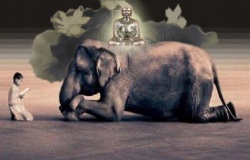Difference between revisions of "Ālambanaparīkṣā"
(Created page with " The Ālambanaparīkṣā (by Dignāga) is a Sanskrit work. English translations have been done by Aiyaswami Sastri and Fernando Tola. The Alambana-pariksa, "E...") |
|||
| Line 1: | Line 1: | ||
| − | + | [[File:1000df.jpg|thumb|250px|]] | |
| − | The [[Ālambanaparīkṣā]] (by [[Dignāga]]) is a [[Sanskrit]] work. English translations have been done by [[Aiyaswami Sastri]] and Fernando Tola. The Alambana-pariksa, "Examination of the [[Object]] of [[Consciousness]]," seeks to establish that the [[object]] of [[consciousness]] ([[alambana]]) as it appears to us is unreal; [[only consciousness]] is real. [[Dinnaga]] (or [[Dignaga]]) was a [[student]] of [[Vasubandhu]], and this text, although brief, is an influential work of the [[Citta-matra]] or [[Mind-Only]] school. [[Dinnaga]] is most famous as the author of the [[Pramana-samuccaya]] and founding father of the [[Buddhist | + | The [[Ālambanaparīkṣā]] (by [[Dignāga]]) is a [[Sanskrit]] work. English translations have been done by [[Aiyaswami Sastri]] and Fernando Tola. The [[Alambana-pariksa]], "Examination of the [[Object]] of [[Consciousness]]," seeks to establish that the [[object]] of [[consciousness]] ([[alambana]]) as it appears to us is unreal; [[only consciousness]] is real. [[Dinnaga]] (or [[Dignaga]]) was a [[student]] of [[Vasubandhu]], and this text, although brief, is an influential work of the [[Citta-matra]] or [[Mind-Only]] school. [[Dinnaga]] is most famous as the author of the [[Pramana-samuccaya]] and founding father of the [[Buddhist school of logic]], and he here uses {{Wiki|reasoning}} to establish his {{Wiki|thesis}}. This [[book]] includes [[Dharmapala's]] commentary, retranslations into [[Sanskrit]] from {{Wiki|Chinese}} and [[Tibetan]], English translations, and [[Tibetan texts]]. |
| + | {{R}} | ||
| + | [http://www.wisdomlib.org/definition/%C4%81lambanapar%C4%ABk%E1%B9%A3%C4%81/index.html www.wisdomlib.org] | ||
| + | [[Category:]] | ||
Revision as of 05:04, 17 January 2015
The Ālambanaparīkṣā (by Dignāga) is a Sanskrit work. English translations have been done by Aiyaswami Sastri and Fernando Tola. The Alambana-pariksa, "Examination of the Object of Consciousness," seeks to establish that the object of consciousness (alambana) as it appears to us is unreal; only consciousness is real. Dinnaga (or Dignaga) was a student of Vasubandhu, and this text, although brief, is an influential work of the Citta-matra or Mind-Only school. Dinnaga is most famous as the author of the Pramana-samuccaya and founding father of the Buddhist school of logic, and he here uses reasoning to establish his thesis. This book includes Dharmapala's commentary, retranslations into Sanskrit from Chinese and Tibetan, English translations, and Tibetan texts.
Source
www.wisdomlib.org [[Category:]]
